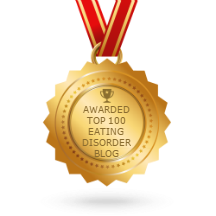- Home
- About
-
Services
- Therapy
-
Eating Disorder Trainings
>
- Clinical Approaches To Treating Body Image Issues
- Clinical Approaches To Treating Bulimia & Binge Eating Disorder
- Finding Freedom From Binge Eating
- Finding Freedom From Anorexia
- Supporting A Loved One With An Eating Disorder
- Eating Disorder Recovery Road Map
- Healing From Body Hate And Practicing Self-Compassion
- Common Questions
- Blog
- Press
- Contact
|
This goes out to the person who is secretly struggling. The one who on the outside appears to have everything together, yet underneath it all, feels trapped. The one who “eats normally” in public, yet binges on a jar of peanut butter, a loaf of bread, and bags of tortilla chips, at night. Who goes to sleep with a painfully aching stomach and feelings of guilt, shame, and self-loathing. Or perhaps you have intense anxiety around the thought of eating at a restaurant, and paint on a false smile, while underneath you are frantically tallying calorie counts in your head. You wish you could just "eat normally," yet it feels like your list of "food rules" is getting increasingly more strict. Maybe you struggle with exercising despite illness and injury. You wish you could let yourself rest, but the anxiety around doing so feels totally unmanageable. Or perhaps you struggle with bingeing and purging. You feel exhausted and unable to stop, yet each time you tell yourself that it will be the last one. Afterwards, you feel disgusting and ashamed. Maybe you question whether you are actually struggling with an eating disorder. That voice in your head may tell you, “But you don’t look sick,” or “You only do this behavior x number of times. It’s not that bad,” or “Eating disorders are illnesses that only impact teens.” These are all statements that your eating disorder may tell you, in an effort to try to keep you from seeking help. While often people struggling with eating disorders are unable to see how “ill” they actually are, it’s also important to note that even if you struggle with disordered eating (rather than an eating disorder)-you still deserve to seek help and support. It’s important to note that eating disorders can impact people of all races, ages, genders, weights, and body sizes. Think of your eating disorder as an abusive partner that will tell you anything to try to keep you trapped in its grip. Maybe you tell yourself that you can handle this on your own, or that you simply need to have “more willpower.” Eating disorders are not a choice and they aren’t about “lacking willpower” or being “shallow.” Rather, they are serious mental illnesses. No one would choose to binge until they feel physically ill, to purge and feel disgusted with themselves, to have constant thoughts about food and body, to have bradycardia and other health complications, to lose friends and to isolate themselves, or to be unable to eat at a restaurant without feelings of anxiety and dread. You Deserve to Seek Help No matter what your mind is telling you, you deserve to seek help from trained professionals. Eating disorders are treatable illnesses and recovery is possible. No one should have to struggle with an eating disorder alone. Seeking help when you are struggling is a sign of true strength, not weakness. Living with an eating disorder can feel miserable. It may give you a temporary “high” or feeling of “comfort,” however in the long run, it only leads to increased anxiety and unhappiness. Maybe part of you is scared or unsure if you even want to let go of your eating disorder. This is entirely normal. However, you’ve been doing things the same way and continuing to have the same result. What if you tried something different? If you find that you hate your life in recovery, you can always go back to your eating disorder. However, once recovered, I don’t think that you will want to. You deserve a life that is free from constant thoughts about food and your body. Take the first step to reach out for help. It will be worth it. Jennifer Rollin, MSW, LCSW-C: is an eating disorder therapist in private practice in Rockville, Maryland. Jennifer specializes in helping teens and adults struggling with anorexia, binge eating disorder, bulimia, compulsive exercise, and body image issues. Jennifer provides eating disorder therapy in Rockville, MD, easily accessible to individuals in Potomac, Bethesda, Olney, Germantown, and Washington D.C. Connect with Jennifer through her website: www.jenniferrollin.com
2 Comments
Today, I was in session with a brilliant client (this is shared with permission) and we got into a conversation about how negative body image relates to ‘the red car syndrome.’ What is ‘The Red Car Syndrome?’ Have you ever had the experience where you are shopping for a specific type of car (let’s say a red Honda) and suddenly you start to notice that car everywhere? This is the known as ‘The Red Car Syndrome.’ However, it doesn’t just relate to cars. The reality is that often the things that we focus on expand. For instance, let’s say that you have the core belief “I am such a failure.” You likely will start to see “evidence” of your belief everywhere. The reason behind this phenomenon is that we have a reticular activating system within the neocortex of our brain. This system helps us to filter important information and impacts what we focus on. It heightens our awareness of certain things. ‘The Red Car Syndrome’ and Negative Body Image So how does this syndrome relate to negative body image? Often for people struggling with negative body image there is a desire to try to change their body, as they believe this will improve their body image. For instance, someone might decide that they need to “lose weight” or to “gain muscle.” When you focus on trying to change your body to reduce or eliminate perceived “flaws,” the negative feelings that you have about your body often expand. When we try to change our bodies, the message that we are sending is that our bodies are flawed. When we view our body as flawed, we will start to see more “flaws.” While focusing on trying to change your body may give you a “temporary high,” in the long-term it leads to increased anxiety and discontent. Ultimately, the more that you focus on what you dislike about your body-the worse you will feel about your body. How to use ‘The Red Car Syndrome’ to Cultivate Positive Body Image I define positive body image as not spending so much time thinking about your body, because you are busy living your amazing life. To use ‘Red Car Syndrome’ to cultivate a more positive body image here are a few quick tips: 1. Start to surround yourself on social media with body-positive accounts and images of body-diversity (i.e. people of all shapes and sizes). 2. Listen to podcasts that promote body-positivity, such as Life Unrestricted with Meret Boxler, Body Kindness with Rebecca Scritchfield, Food Psych, The BodyLove Project Podcast with Jessi Haggerty, and Fearless Rebelle Radio with Summer Innanen. 3. Make a list of the things that you are thankful for that your body does for you (i.e. body function). 4. Make a list of the qualities that you appreciate about yourself, which have nothing to do with your appearance. 5. Think about hobbies or interests that have nothing to do with your body, appearance, or food, and begin to pour your energy into those things. The Bottom Line Struggling with constant thoughts about food and your body can feel exhausting. However, with access to support and treatment-you can find freedom. If you are struggling, it’s so important to be compassionate with yourself. It’s not your fault if you are suffering, however you can make the choice to seek help and to start to do some of these exercises. After all, your life is worth so much more than spending your time hating your body and trying to change it. Jennifer Rollin, MSW, LCSW-C: is an eating disorder therapist in private practice in Rockville, Maryland. Jennifer specializes in helping teens and adults struggling with anorexia, binge eating disorder, and bulimia, and body image issues. Jennifer provides eating disorder therapy in Rockville, MD, easily accessible to individuals in Potomac, Bethesda, Olney, Germantown, and Washington D.C. Connect with Jennifer through her website: www.jenniferrollin.com Do you want to come to dinner with us tonight? Her friend asks.
The spiral begins. Her anxiety is mounting. She finds herself lost in endless Google searching of the menu, trying to calculate the nutrition information, searching for pictures of the different options. Her mind is racing, trying to figure out what she can order. It all feels completely overwhelming. It’s no wonder that she’s started declining invitations for meals out, when she is so filled with anxiety and dread. She feels increasingly isolated and alone. Walking by others laughing and eating outside at restaurants, she finds herself looking at them wondering how they can appear so calm and relaxed around food. She struggles with constant thoughts about food, weight, and her body. She finds herself bone-chillingly cold at times. She feels completely trapped. She is not simply making the choice to restrict food, decline invitations to go out to eat, or to exercise despite illness or fatigue. She is struggling with a serious mental illness. As an eating disorder therapist in private practice, I am grateful to be able to help people to recover from eating disorders. The following are three tips for your recovery from anorexia. 1. Start to separate out “the eating disorder self” from the “healthy self.” When I work with clients, often we will start to differentiate between their “eating disorder self” and their “healthy self.” An Example: Eating Disorder Self: “You can’t eat that. It will make you gain weight and it’s so bad for you.” Healthy Self: “No food is good or bad and I deserve to nourish myself with food that I enjoy. What’s truly unhealthy is feeling anxiety and guilt around food.” The first step is starting to recognize the unhelpful thoughts that you’re eating disorder self may be telling you. Then you can practice telling yourself more helpful coping statements, and taking actions that align with your “healthy self” values-no matter what your mind is telling you. 2. Practice acting “as if.” This tip is essentially the “fake it until you make it” approach. Even if your “eating disorder self” is telling you a ton of unhelpful things, it’s crucial to practice taking pro-recovery actions anyways. Often the actions come before the thoughts start to change. Our thoughts alone do not have power to harm us. Therefore, no matter what your eating disorder is telling you to do, it’s important to practice taking actions that help to support your recovery-rather than fuel you’re eating disorder. 3. Set small goals to challenge yourself. It’s so important to challenge yourself and to “step out of your comfort zone” when it comes to recovery from anorexia. Ideally, with the support of a treatment team-it is crucial to start to set small goals to start to challenge any food or exercise rules and rituals. This can help to build your confidence in your ability to recover, and help to break these unhelpful rules and patterns. For example, you might make a list of any “fear foods” and work to gradually challenge yourself to have them (multiple times)-with the support of your therapist, dietitian, or loved one. The Bottom Line Often for people struggling with anorexia, there’s this belief that they are “not sick enough” to seek treatment or to work towards recovery. It’s important to note that typically there is no point where your “eating disorder self” deems you as “sick enough.” If you are struggling, you deserve to seek treatment and support. No one should have to battle an eating disorder alone. Additionally, People struggling with anorexia can come in a variety of shapes and sizes and it’s important to point out that you do not have to appear emaciated (or even thin) to be intensely struggling. Eating disorders are mental illnesses and you can’t tell who is struggling based upon their physical appearance. Ultimately, living with anorexia is a pretty miserable experience. While there may be short-term feelings of a false “sense of control,” or a high, in the long-term, it typically leads to misery, depression, and isolation from others. While anorexia is a terrible mental illness that is not a choice, you can make the decision to seek help and start on the path to recovery. There is a beautiful life waiting for you on the other side of this eating disorder. Freedom and full recovery from anorexia is possible. Yes, for you too. Jennifer Rollin, MSW, LCSW-C: is an eating disorder therapist in private practice in Rockville, Maryland. Jennifer specializes in helping teens and adults struggling with anorexia, binge eating disorder, bulimia, compulsive exercise, and body image issues. Jennifer provides eating disorder therapy in Rockville, MD. Connect with Jennifer through her website: www.jenniferrollin.com |
About MeI'm an eating disorder therapist in private practice in Rockville, MD. Archives
June 2024
|




 RSS Feed
RSS Feed
